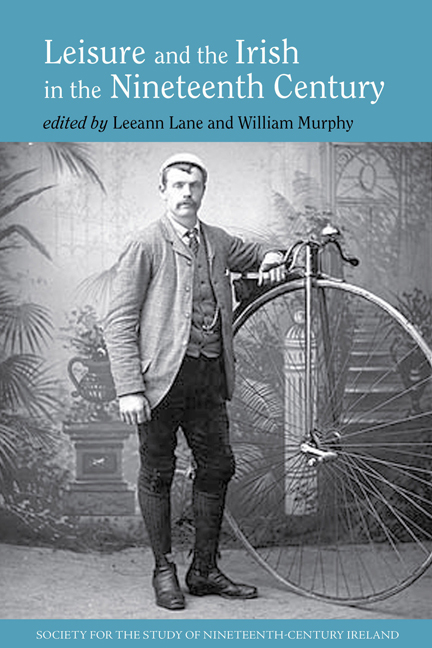Book contents
- Frontmatter
- Contents
- List of Figures and Tables
- Introduction
- Leisure and Associational Culture
- 1 Politics as Leisure: Brass Bands in Cork, 1845–1918
- 2 The Functions of Association Football in the Boys’ Brigade in Ireland, 1888–1914
- Leisure Spaces
- Leisure in Literature
- Leisure, Tourism and Travel
- Leisure and Female Élites
- Notes on Contributors
- Index
1 - Politics as Leisure: Brass Bands in Cork, 1845–1918
from Leisure and Associational Culture
- Frontmatter
- Contents
- List of Figures and Tables
- Introduction
- Leisure and Associational Culture
- 1 Politics as Leisure: Brass Bands in Cork, 1845–1918
- 2 The Functions of Association Football in the Boys’ Brigade in Ireland, 1888–1914
- Leisure Spaces
- Leisure in Literature
- Leisure, Tourism and Travel
- Leisure and Female Élites
- Notes on Contributors
- Index
Summary
The recreational aspect of popular political participation in modern Ireland has been studied by Elizabeth Malcolm, Vincent Comerford and Mike Cronin, amongst others. Without depoliticising movements, actors or events, one can recognise the appeal of politically affiliated recreation as a means to disseminate propaganda and strengthen grass-roots organisation. George Mosse's studies of political rites, liturgies and festivals have clear implications for the voluntary civic groups attached to nineteenth- and twentieth-century Irish nationalism. Sigrid Robteutscher has argued that such associations are ‘political culture's mirror’, explaining that these groups, ‘reflect and amplify the dominant political culture traits of their environment’ (Robteutscher's emphasis). Studying Irish brass bands from the years 1845 to 1918 can therefore improve our understanding of Irish political culture of that period, as well as provide an interesting example of the interplay between leisure time and political participation.
While brass bands in Northern Ireland have received significant international scholarship, their southern counterparts remain relatively neglected. This chapter will contextualise the latter within the south of Ireland's rich nationalist tradition of processional creativity and contested public space. Brass bands in Cork city during the second half of the nineteenth century and the early twentieth century will be investigated, building on the work of historians John McGrath, Fintan Lane and especially Maura Cronin. This chapter will not attempt to determine whether musical recreation was subordinated to politics (or vice versa), nor will it explore the bands’ non-political activities, such as band concerts, promenades and devotional processions. It will survey the political participation of Cork brass bands in nationalist political events from 1840 to 1918, including those associated with Daniel O'Connell, the Fenians, Charles Stewart Parnell, the Land League, John Redmond and William O'Brien. The bands considered here were primarily working class, amateur, male-only and self-governing. The politicisation of their leisure time was part of a broader trend within Irish popular politics during this period. The implications of this were clear to Maura Cronin, who wrote, ‘much of this process of politicisation through pastime tended to foster an unthinking commitment to popular causes within a very wide sector of the working-class population’.
- Type
- Chapter
- Information
- Leisure and the Irish in the Nineteenth Century , pp. 23 - 40Publisher: Liverpool University PressPrint publication year: 2016



